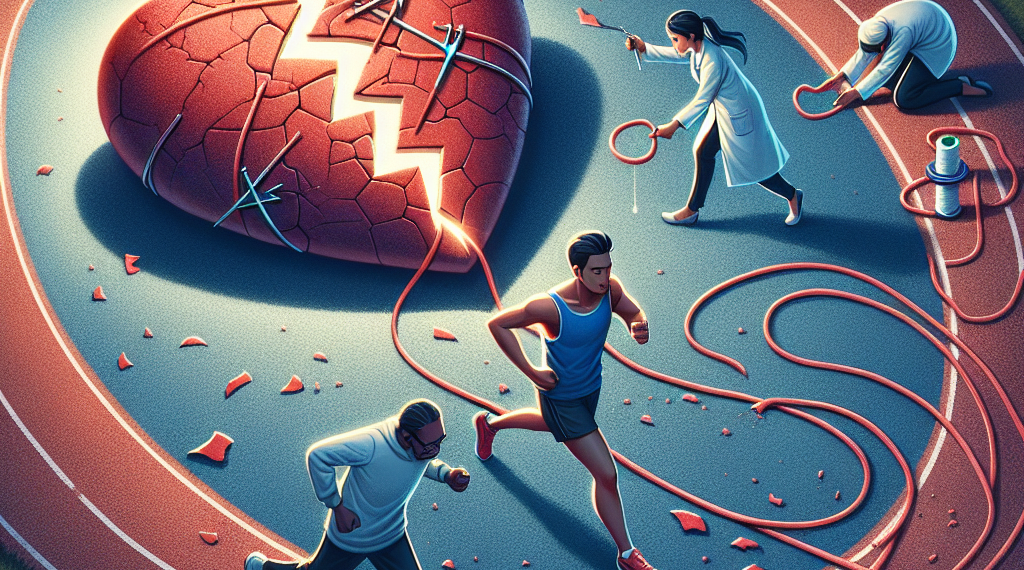Heartache is a heavyweight champion that nobody wants to spar with. It leaves you reeling with emotional gut punches and, believe it or not, can even reshape your heart – quite literally. The ‘broken heart syndrome’ or Takotsubo syndrome is the medical world’s acknowledgment that what happens in the mind vividly echoes in the body. The parallel with athletes isn’t just about the pain endured; it’s about the comeback. Just like an injured athlete, those with battered hearts can channel a disciplined recovery to emerge stronger. So, lace up those emotional sneakers, and let’s get to training. To truly grasp this connection, consider the physical discipline and mental resilience athletes must cultivate after an injury; in much the same way, those suffering from heartbreak must exercise emotional tenacity and self-compassion to heal and grow from the experience.
Harnessing the Athlete’s Mindset to Heal a Broken Heart
The athlete’s mindset is all about focus, determination, and strategy – key elements in overcoming any form of setback, including the emotional turmoil of a breakup. Neuroscientist Zoe Donaldson’s advice is simple yet profound: let yourself feel the sadness, but also be proactive in self-care. Picture a runner with a sprained ankle; they don’t just keep running. They take the time to heal, and so should you with heartbreak. It’s also crucial to adapt to love and loss, just like athletes adjust their play to match their opponent. Our bodies are wired for recovery, with systems in place that enable us to bounce back if we leverage them correctly. Think of it as training your emotional resilience, much like an athlete works to strengthen their body and skills, building a regimen of healthy habits and coping mechanisms that supports recovery from the inside out.
Embracing the Power of Self-Care and Recovery Time
Self-care isn’t just spa days and bubble baths; it’s recognizing that giving yourself time to recover is not just acceptable – it’s necessary. Like an injured athlete, your heart needs to recuperate. This is where Helen Fisher’s guidance comes into play. She suggests that actions as simple as hugging can elevate oxytocin levels in the brain, reducing the addictive pull of memories with an ex-partner. Self-care also includes mindfulness and stress reduction techniques, steering the focus back to the present and curbing the ruminations on a past relationship. It is the equivalent of following a balanced diet and getting adequate rest to give your body the best chance at healing; you’re allowing your emotional wounds the space and nurturing they need to mend.
Leveraging Social Support for Emotional Rehabilitation
Isolation is the enemy of recovery, both for the physically and emotionally wounded. Social support is like the medical team for an injured athlete, providing the care and encouragement needed to get back on track. It’s well-documented that people cope better with stress and trauma when they have a supportive community around them. This could mean leaning on friends, family, or even joining support groups where shared experiences foster healing. Just as a physical therapist would guide an athlete through exercises to regain strength, a strong support network can offer guidance and reassurance, reminding you that you’re not alone in your journey and that healing is possible.
Reconsolidation Therapy and A New Playbook for Healing
Imagine being able to tackle the painful emotions from bad memories without losing the memories themselves. That’s the promise of reconsolidation therapy, an innovative approach being researched by Montreal’s Alain Brunet. By combining propranolol, a beta-blocker known to ease physical symptoms of anxiety, with psychotherapy methods such as Cognitive Behavioral Therapy (CBT), the emotional weight of those memories can be lifted while preserving the lessons they hold. This therapeutic approach is much like revising an athlete’s playbook after an injury, it doesn’t erase the past but rather helps the individual change their emotional responses, empowering them to face future challenges with greater resilience.
Creating New Experiences to Rebuild After Loss
Athletes don’t just recover; they return to the game with new strategies. Similarly, heartbroken individuals should seek out fresh experiences to regain a sense of self and purpose. Engaging in new activities or adventures can spike dopamine levels, which are crucial for mood and motivation. And it doesn’t stop there. Steve Cole suggests finding purpose through altruistic activities, as doing good for others can be a powerful antidote to the pain of heartbreak. Exploring new horizons is akin to an athlete cross-training to enhance their performance; by diversifying your experiences and focusing on personal growth, you’re not only mending but also expanding your emotional repertoire, fostering a newfound strength and vitality.
The path to mending a broken heart is not a straight line – it’s a series of disciplined steps, self-care, and support. Like an athlete in rehabilitation, it takes time, patience, and a little strategy. But with each day, the comeback gets closer, until you’re back in the game, stronger and more resilient than before. The journey through heartbreak, then, is not just about recovery; it’s a transformative process that, with the right mindset and tools, can lead to profound personal development and a robust emotional constitution, equipping you for whatever life may throw your way in the future.










